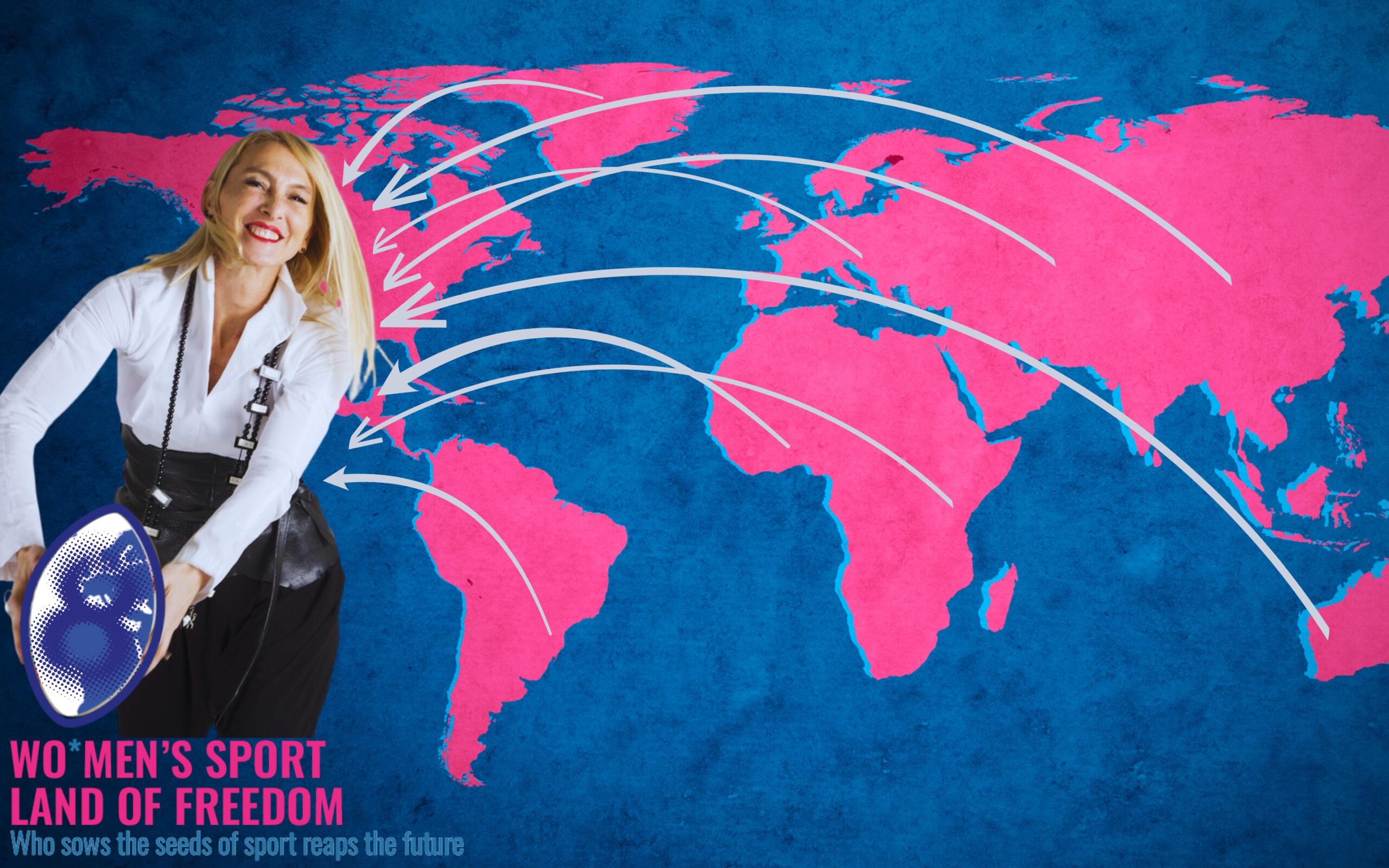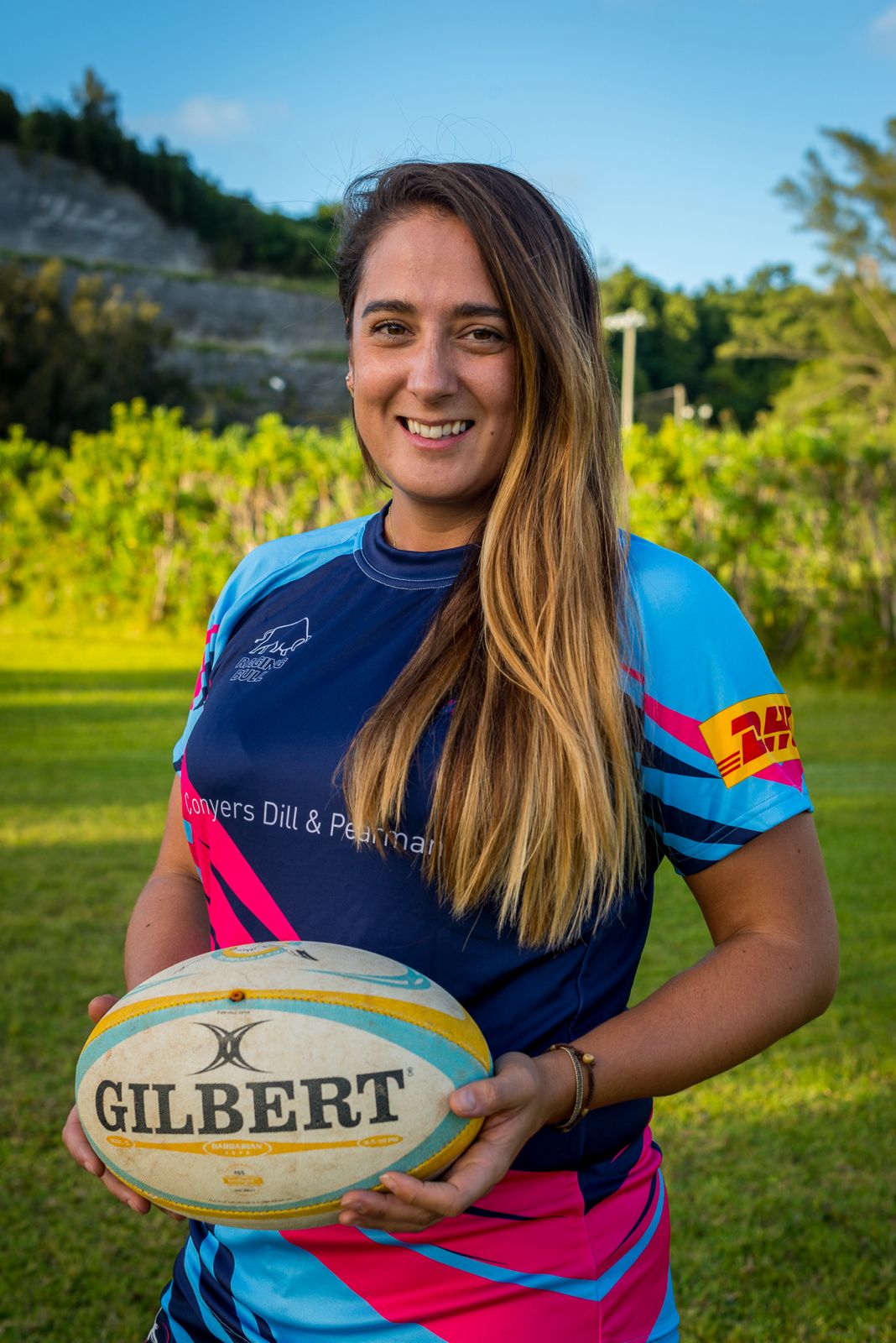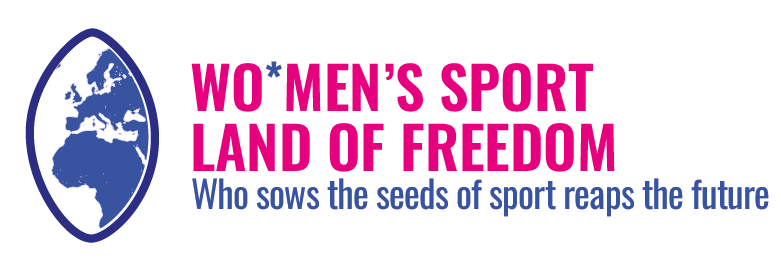
BERMUDA: IT GAVE ME A COMMUNITY AT A TIME WHEN I WAS LOOKING FOR CONNECTION, AND IT REMINDED ME THATH LEADERSHIP DOESN’T MEAN BEING THE LOUDEST VOICE IN THE ROOM, BUT SHOWING UP, STAYING ACCOUNTABLE, AND SUPPORTING OTHERS.
“It gave me a community at a time when I was looking for connection, and it reminded me that leadership doesn’t mean being the loudest voice in the room, but showing up, staying accountable, and supporting others”

Thanks to:
Gemma Godfrey
President, Bermuda Rugby Football Union
- The history of the women’s movement in Bermuda
- Testimonials
- Reading time: 7 minutes
BERMUDA - Find out more
Bermuda is a British Overseas Territory in the North Atlantic with around 65,000 inhabitants in 2024 and a slight female majority. Women hold 25% of parliamentary seats and participate in the labor force at 57.4%, compared to 72.6% of men. Despite high levels of education and income, gender gaps persist in leadership roles and in the distribution of unpaid labor.
(Source: data.unwomen.org; World Bank Gender Data Portal; IPU Parline; Government of Bermuda Statistics)
HISTORY OF THE COUNTRY
1. When did the women’s rugby movement start in your country and what is its history? How is rugby structured in your country?
The women’s rugby movement in Bermuda began in the 2006–2007 season, with the first activities centered around touch rugby. From there, it gradually developed into a women’s contact rugby team, and in 2008 Bermuda played its first international women’s rugby match under the umbrella of NIWIRA (later incorporated into Rugby Americas North, RAN). Since then, the program has steadily grown, laying the foundation for two decades of women’s participation in both contact and touch rugby. Women’s rugby in Bermuda began with informal touch matches around 2006, eventually evolving into a structured team. The first matches were played against visiting U.S. sides during events like the Easter 7s. Those early years were essential for building confidence, increasing the number of players, and establishing an initial organizational framework.
In 2008, the Bermuda women’s national team played its first international match as part of NIWIRA, marking a key milestone for legitimizing women’s contact rugby on the island. Over the years, the sport has faced challenges typical of small island contexts: a limited player pool, scarce resources, and gaps in youth development. Nonetheless, it has grown thanks to passionate volunteers, returning athletes, and players who also contributed as coaches and administrators. Parallel growth has also been seen in touch rugby, which has offered a more accessible format to keep women’s participation strong. In 2025, the women’s program prepares to celebrate 20 years of women’s rugby in Bermuda. Currently, the island has four main clubs — Renegades, Mariners, Police, and Teachers — competing in a non-contact touch rugby league. Due to Bermuda’s small size and limited player numbers, women’s contact rugby has often been organized as a centralized program rather than club-based, focusing primarily on rugby sevens, which suits the restricted player base. Training is largely run at national level, with a single shared player pool instead of a traditional club championship. Touch rugby, by contrast, has a slightly more decentralized structure, with club, corporate, and social teams running regular mixed and women’s competitions. The Bermuda Rugby Football Union oversees the development of both contact and touch rugby and is increasingly committed to reintroducing structured youth pathways for girls in schools, ensuring sustainable growth.
2. Do you think playing rugby has a social impact for women in your country? In your opinion, what can rugby offer to women in Bermuda?
Absolutely. Rugby offers in Bermuda a rare space where women can challenge social norms, build confidence in their own bodies, and find a true community. For many women, rugby was their first experience in a contact sport — testing not only how they viewed their physicality but also what women were “supposed” to do or look like in sport. The camaraderie, discipline, and resilience developed through rugby have empowered women on and off the field — whether in leadership roles, mentoring, or simply in learning to trust their own strength and voice. The social impact is particularly profound in a small community like Bermuda, where visibility matters. Seeing women in traditionally male-dominated spaces like rugby helps redefine expectations for the next generation. Rugby can give Bermudian women a sense of belonging, purpose, and confidence that goes well beyond the playing field. It offers a place to be strong, part of a team, and to develop leadership skills in a context that values resilience and character. Rugby is also a tool of connection — across social backgrounds, professions, and generations — becoming a lifelong support network for many women. On a broader scale, rugby helps women in Bermuda see themselves as athletes, leaders, and agents of change. For some players, rugby has been transformative, thanks to scholarships and study-abroad opportunities they would not otherwise have had. In a culture where women’s sport still struggles for equal visibility and resources, rugby provides a platform for women to be seen, heard, and celebrated.
JOURNEYS THROUGH RUGBY
1. When did you start playing rugby and how did you discover it?
I hadn’t played competitively before moving to Bermuda in 2012. At the time, I was still trying to settle in socially, having just relocated to the island, and most of my free time was spent training in boxing and martial arts — sports I had always loved and competed in while living in the UK.
Then one day, a player from a local women’s club team asked me if I had ever considered playing rugby. I said, “Not really, but I do like hitting things,” and apparently that was the only qualification I needed to get invited to my first training session. From that very first session, I was hooked — not only by the physicality, but by the people I met on the pitch and the immediate sense of belonging. From there, I never looked back. I worked my way into the Bermuda women’s national team, representing the country and competing in several international tournaments. Looking back, rugby had been circling around me for years, but I had never quite “landed” on it. I may have come to the game later in life, but once I did, it became a central part of who I am — and eventually led me to leadership roles I could never have imagined for myself. My first real encounter with rugby was actually back in high school in England, when our PE teacher, a former prop, tried to start a girls’ team — the first in our region. I was very athletic and up for anything, and with my height and build, he was keen to put me in the forwards. A few of my friends joined too, but as soon as the boys found out, we were teased for playing a “boys’ sport.” At that age, fitting in felt more important than pushing boundaries, and gradually the girls stopped showing up to training — me included. At that time, the local environment wasn’t ready to support girls in contact sports, and honestly, neither were we. I had another chance at university, when I was invited to trial for the women’s development team at Loughborough University, but since I was already competing in martial arts, I didn’t have the time to commit. That was another missed opportunity — but one that planted a seed. Years later, when rugby came back into my life in Bermuda, I finally had the confidence and the right environment to give it a real chance.
2. What has rugby taught you that has impacted your daily life? Can you give me an example of when a rugby mindset was useful?
Rugby has taught me resilience — not just physical, but emotional. It pushed me to face insecurity and step outside my comfort zone, whether it was learning new skills on the field or stepping into leadership roles off it. It gave me a community at a time when I was looking for connection, and it reminded me that leadership doesn’t mean being the loudest voice in the room, but showing up, staying accountable, and supporting others — even when it’s really hard. When I became President of the Bermuda Rugby Football Union, I battled imposter syndrome constantly. I didn’t have the decade-long playing career that many of my predecessors had. I wasn’t a well-known name in the local rugby scene, and I was stepping into a role traditionally held by men — at a time when the Union was emerging from one of the most difficult periods in its history. The pandemic had shut down our programs, drained our resources, and shaken our community. But rugby teaches you to believe in yourself even when the odds are stacked against you. It taught me that you don’t need to be the strongest player on the field. You just need to be willing to do the work, take the hits, and get back up. That mindset helped me step into leadership — not because I had all the answers, but because I was committed to the team, to rebuilding, and to serving something bigger than myself. It reminded me that true strength doesn’t come from certainty — it comes from showing up anyway.
3. Can you give me three words that connect rugby with freedom?
Courage, Belonging, and Service.
4. What does living in a land of freedom mean to you?
For me, it means having the space and the support to try, to fail, to grow, and to contribute without fear of being silenced or dismissed. This kind of freedom isn’t just about rights on paper — it’s about culture. And in today’s world, where judgment can be instant and brutal, where people are often afraid to speak up, defend others, or go against the grain, that culture can be hard to find. Rugby gave me a different experience. It offered me a space where I could learn by doing, where mistakes were part of the process and not something to be punished for. Where your contribution was valued, even if imperfect or not always in agreement with others. That, for me, is real freedom: the ability to show up fully, to be heard, and to be held accountable without being silenced. Rugby isn’t perfect, but it models a kind of freedom we need more of — one that values courage over perfection and community over conformity.
5. What object represents you and why? What is an aphorism that guides your life?
If I were an object, I would be a rock — more specifically, a gem. I’ve collected them since I was a child, encouraged by my parents (perhaps because of my name!), but more recently I’ve been drawn to the idea of something beautiful and powerful that is formed under pressure. Some gems are rough, some polished, and some you might pass by without noticing unless you know what to look for. That idea of being a “hidden gem” resonates deeply with me, especially when I think about the growth of women in rugby. We’re not always the obvious choice, not always the loudest in the room — but when given the opportunity and the investment, we show up with strength, resilience, and something remarkable to offer just beneath the surface. On the field, I was often the one doing what we called the “rock work” — breaking the line, taking the tackle, doing the unglamorous jobs that kept the game moving forward. Off the field, I’ve often taken on the same kind of leadership role: not flashy, but grounded, consistent, and built to keep things progressing. That’s something I aspire to for Bermuda rugby. In moments of doubt, I remind myself: “Return to yourself.” It’s a quiet mantra I often lean on, especially when I feel out of place, uncertain, or overwhelmed. Whether it’s stepping into leadership without the traditional resume, taking responsibility in difficult times, or facing the expectations placed on women in sport, I’ve learned that clarity doesn’t come from looking outward. It comes from rooting yourself in who you are, what you stand for, and why you began. Rugby helped me build that internal compass. It’s about trusting that even in doubt, you are still enough. That your quieter voice is still valid. That strength isn’t about having all the answers, but about knowing how to come back to yourself when everything else feels unclear. And when the noise gets loud or the pressure rises, I try to pause, recalibrate, and return to the person who found belonging, courage, and purpose through the game.
